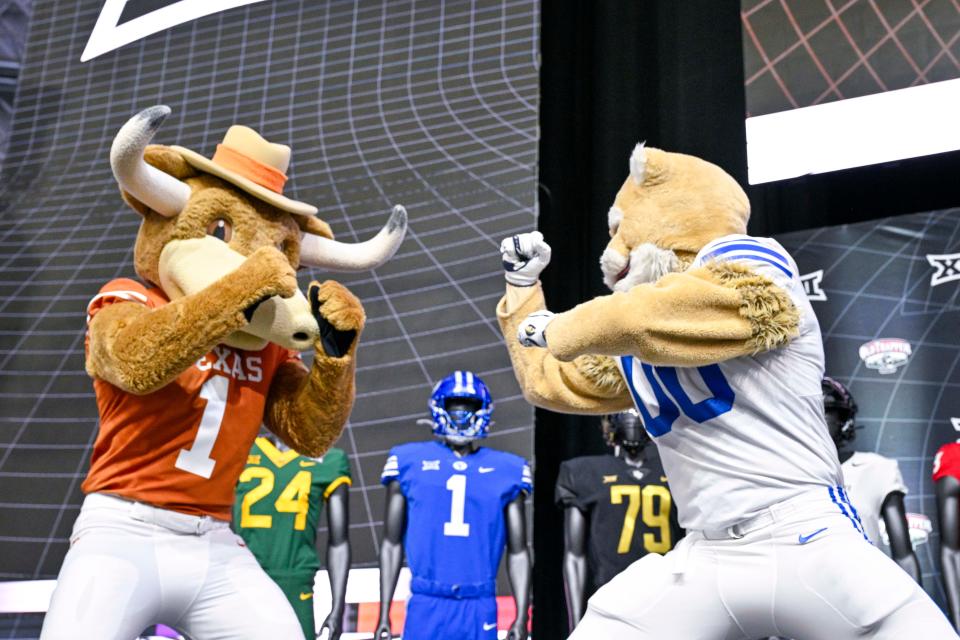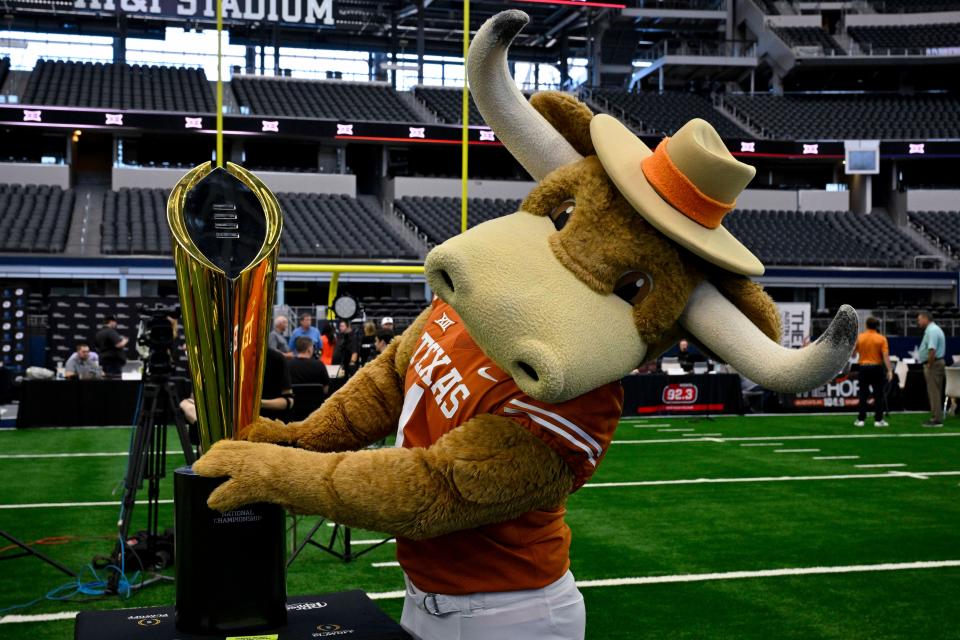Was Big 12 deputy commissioner Tim Weiser right about why OU, Texas are headed to SEC?
Commissioner Brett Yormark played the good-cop role at Big 12 Media Days two weeks ago. Said the league would celebrate OU and Texas as the Big 12 cornerstones play out one final season before leaving for the Southeastern Conference.
Then the bad cop entered the interrogation room. Deputy commissioner Tim Weiser, talking to the KC Sports Network, painted the Longhorns as licking their wounds and the Sooners as reluctant brides.
Outside of loose-tongued coaches capable of saying most anything — Lane Kiffin, Mike Gundy, the late Mike Leach — you don’t often get provocative talk like that in college football.
But while we initially focused on the entertainment value of Weiser’s declarations and the motivational strategy of delivering a suckerpunch when the Sooners and ‘Horns were being fitted for laurel wreaths, my mind wandered to veracity.
Was Weiser on target?
More: How 'The Godfather' factors in ranking Big 12 football's top defensive lines
Big 12 Deputy Commissioner Tim Weiser on UT/OU:
“I think their (decision) was more about affiliating with a group of schools…they would rather get beat by Alabama than Kansas State. Or Florida than Iowa State."
Full interview: https://t.co/WpNjXdmEfO… pic.twitter.com/k1AEXj0Loh— John Kurtz (@jlkurtz) July 13, 2023
We’ll never know for sure, of course, because when you talk about institutional motivation, you’re talking about a variety of decision-makers, which can make for a cloudy outcome.
But we can surmise. We can play lexicologist and dissect Weiser’s words. He’s a smart guy — former Kansas State athletic director; liaison between Big 12 presidents and the conference legal counsel, so communicating is part of his job description. Weiser knows what he said. And here’s what he said, as it pertains to Texas:
“I continue to maintain that the choice Texas made wasn’t a financial one, because we all know what Texas’ resources are like. I think theirs was more about affiliating with a group of schools that on a given Saturday, they would rather get beat by Alabama than they would Kansas State. Or Florida than Iowa State. That, I think, is what drove what they were looking at down the road.”
Give Weiser credit. That’s a shot across the bow.
OU going to the SEC had a certain if-you-can't-beat-’em-join-’em element. The Sooners have had a devil of a time against SEC woolly mammoths in College Football Playoff games.
Weiser seemed to be saying that Texas was more if-you-can't-beat-’em-at-least-avoid-the-ignominy-of-losing-to-’em.
And Weiser has a point. UT has not exactly run roughshod over its lower-statused Big 12 partners.
You won’t get anyone in the SEC to believe the following numbers, but they are true. The cumulative Big 12 standings from 2010-2022:
OU 89-26 (.774), OSU 76-40 (.655), Kansas State 67-49 (.578), Texas Christian 56-43 (.566), Baylor 65-51 (.560), Texas 61-54 (.530).
More: Iowa State defenders offer advice for Oklahoma State players learning 3-3-5 defense
That’s 13 years worth of data, and the Longhorns rank sixth in the 10-team Big 12. In Norman, the worry is how to keep up with Georgia, Alabama and Louisiana State. In Austin, the worry has been how to keep up with OSU, TCU and Kansas State.
Texas has a unique place in college football. Like OU and Bama and Michigan and Oregon and Washington and a host of others, it’s the big dog — or ought to be — in a state. But unlike others, the Longhorns long have had multiple in-state foes sniping at their status.
Texas A&M, Tech, Baylor, TCU, Houston, once-upon-a-time Rice and Southern Methodist.
Cut the ‘Horns some slack. For much of their history, they’ve been six or seven teams’ arch-rivals. That’s not an easy emotional path.
Then 12 years ago, Texas A&M jumped to the SEC and reaped all the financial and marketing benefits that go with such an association. It hasn’t helped the Aggies on the gridiron — they are exactly in the SEC what they were in the Big 12 — but their stadium is bigger and their hype is bigger and their recruiting profile is bigger.
That alarmed the Longhorns, as it should. Especially when UT, over 13 years, is 52-52 against Big 12 teams other than Kansas.
Losing to Baylor and TCU and Texas Tech wears on the ‘Horns. And unlike, Bedlam, which OU has dominated for 120 years, Texas loses to its in-state rivals on a regular basis.
So yes, losing to Florida and Auburn, much less to Alabama and LSU, seems like a better option for UT.
More: 'I love where he's at': OU's Brent Venables expects big things from Dasan McCullough

“In Oklahoma’s case, I’m not so sure that was the issue for them,” Weiser said. “I think they were more what you would call ‘the reluctant bride’ that kind of felt like, ‘Well, if we don’t go, what happens to the Texas-OU football game? The basketball game?’ All of those things we know are important from a Texas-OU standpoint. If I was in Oklahoma’s case, it would be hard for me to not think about the long term ― ‘Do we want to be affiliated with Texas and these other schools?’”
This is sort of beside the point, but Weiser seems to be giving the Sooners a pass. Blaming the exodus squarely on Texas.
That’s nothing new for the Longhorns. They long have been branded as the Big 12’s boardroom bullies, maybe with some justification, but in the old days, OU, Nebraska and A&M threw around their weight about as much as did Texas. And in the 10-school Big 12, OU and Texas have lorded over the others, not necessarily with overt threats of leaving, but with that option on everyone’s minds.
Weiser is right. Money is not a problem on the Forty Acres. Texas’ move to the SEC wasn’t necessarily motivated by finances.
OU’s was. Back in July 2021, the Sooners said — on and off the record — the move was about money, and there’s nothing to dispute that now.
And Weiser also was right about the Sooners not wanting to disconnect from Texas. OU and UT were ancient non-conference rivals for a virtual century, but now they’ve been league-aligned for 27 years and like it just fine. At least the Sooners do.
When the Pac-12 dalliance of 2010-11 began to crumble, and Texas decided it was better off sticking around the Big 12 and keeping the Longhorn Network, an OU/OSU move to the Pac-12 was discussed. The Pac-12 was lukewarm, and the Sooners weren’t crazy about the idea, either, since it meant returning the Texas series to a non-conference relationship.
If OU had gone to the Pac-12 without the Longhorns, or Texas had gone to the SEC without the Sooners, I think the Red River Rivalry tradition in Dallas would have continued.
More: Tramel: Big 12 riding high, with great parity and TCU coming off a national-title game

But I don’t know. I never thought Texas A&M-Texas would go on a 13-year hiatus. Never thought Bedlam would die. Never thought Kansas-Missouri would go away. Never thought West Virginia-Pittsburgh would be kicked to the curb. Never thought the Brigham Young-Utah Holy War would lay down its arms.
Realignment causes college football people to lose their mental and emotional bearings.
The Sooners don’t care at all about OU-Texas basketball, but Red River football is a special enterprise. No way did OU (or Texas, I don’t think) want to jeopardize the annual trip to Dallas.
The real question about the move and Weiser’s OU comment is this: Who was leading who?
OU and Texas paint the defection as mutually decided, which of course it was, but that’s not the same as mutually birthed.
Was their decision born out of long, commiserating discussions that migrated into curiosity about the SEC?
Or was their decision hatched on one particular campus (Texas), then shared with the other campus, including an invitation to join the wagon train?
OU and Texas paint the former as accurate. But others say the latter, with the Longhorns deciding to go and offering the Sooners the chance to call shotgun.
The truth probably is in the middle. Texas had much more discontent with the Big 12 than did OU. When the Sooners declared for the SEC two Julys ago, they were in the glory days of Sooner sports. Football ruled the conference. Basketball was doing fine. Women’s sports were the best in school history.
Texas football was struggling. There was no great risk, leaving for the SEC. Mediocre in the SEC is better than mediocre in the Big 12.
Weiser was mostly right.
Berry Tramel: Berry can be reached at 405-760-8080 or at btramel@oklahoman.com. He can be heard Monday through Friday from 4:40-5:20 p.m. on The Sports Animal radio network, including FM-98.1. Support his work and that of other Oklahoman journalists by purchasing a digital subscription today.
More: Tramel's ScissorTales: Why Joey McGuire believes Big 12 title goes through Texas Tech
This article originally appeared on Oklahoman: Was Big 12's Tim Weiser right about why OU, Texas are headed to SEC?

